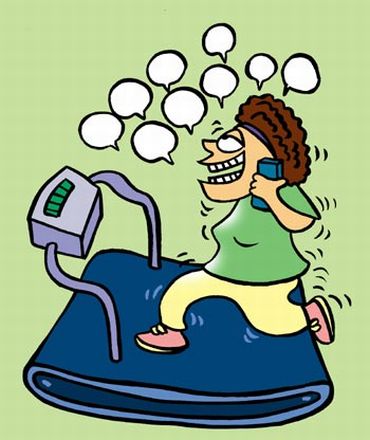 | « Back to article | Print this article |
Five steps toward a better sex life
Keep that spark going when it comes to your bedroom antics!
Good sex is a tonic for the body and the soul. It is an exciting way of losing calories. Additionally, sex three or more times a week can reduce the risk of heart attacks by half. Regular sex can also elevate your mood and alleviate pain, give your skin a better glow, combat depression, act as an excellent stress buster, boost your immunity and help you live longer!
If you are on a quest for sexual bliss, you must try the following to ensure a good sex life:
1. Communicate
Sex is a two way game -- the mutual satisfaction of both partners is key to a gratifying sexual relationship and healthy sex life. Let your partner know about your health concerns and your sexual health history. Encourage your partner to voice his/her concerns too. Assert your wants and preferences without being apologetic about it; at the same time be sensitive to your partner's needs and wants.
An honest interaction fosters trust, respect, love, and affection between partners and enhances their sexual, emotional, and spiritual intimacy.
Illustrations: Uttam Ghosh
2. Stay medically fit
It is important to practice monogamy to have a blissful sexual relationship. Equally important is to practice safe sex methods for a better, prolonged sex life.
If you are unsure of your partner's health, use a condom and be safe. If you think either of you has an infection, seek medical advice. Do not have unprotected sex until the infection is cleared!
HIV is not the only infection that is transmitted sexually. Some more common conditions that can be transmitted sexually include gonorrhea, syphilis, trichomoniasis, chancroid, genital herpes, genital warts and hepatitis B infection. Many of these often exist without any symptoms. Get checked for STDs (sexually transmitted diseases) every year and ensure your safety.
3. Stay in charge
Quit smoking -- it causes erectile dysfunction and can lead to infertility. Limit the use of alcohol, too. Alcohol may provoke your desire, but in quantities larger than 30 to 50 ml, it can result in poor performance.
Is your sex drive lowered? Are you unable to achieve or sustain an erection? Do you experience vaginal dryness or decreased sensation in your genitals? Medicines such as those prescribed for depression, epilepsy, high blood pressure or high cholesterol can disrupt your sex life. Talk to your doctor. He may change the dose or suggest an alternative medication.
Birth control pills can also decrease your sex drive or cause dryness of the vagina. Changing over to a different pill type ('multiphasic' in place of 'monophasic' pills) or using another method of birth control often helps.
4. Evolving over time
Accept the fact that sex evolves with the passage of life and with the different phases and stages in your life. Talk about it as a couple. If you are still concerned, see a doctor.
Do you avoid sex during your periods? There is no need to! Those who have sex during menstrual bleeding have nearly 1.5 times lower risk of developing a gynecological disorder called endometriosis (Gynecologic and Obstetric Investigation, 2002). Sex also keeps the vagina soft and reduces premenstrual pain.
Generally, sex during pregnancy can be safe and enjoyable. Your doctor may, however, advice against an intercourse in case of preterm labour, a couple of miscarriages, infection or bleeding. Your sex drive may dip or surge during pregnancy. Sex drive in men also changes with a pregnant partner. The 'new' body excites some men. Others are too anxious about their partner's and the baby's comfort and safety. Pregnancy is a great time to experiment. You may find the woman-on-top position or the side-lying position more comfortable. Or try non-coital sexual pleasures such as cuddles, kisses, and sensual massages!
During breastfeeding, there may be vaginal dryness. A water-based lubricant such as KY Jelly often helps. A little extra foreplay can also do wonders!
At menopause, the levels of the sex hormones drops and so does your overall desire for sex. Often menopausal symptoms such as vaginal dryness, fatigue, mood swings, weight gain and changes in your skin and breasts can also affect the way you feel about your sexuality. Help your doctor choose the right treatment option for you -- lubricants, hormone creams, hormone replacement therapy (HRT), or a testosterone patch.
Do your erections take longer to occur or not last through the act? Is the urge to ejaculate not as insistent as it was earlier? Has the desire for or frequency of masturbation changed? This may be due to 'male menopause'. It occurs due to gradually declining testosterone levels. Exercises or medications such as testosterone replacement therapy often help.
5. Exercise
Sex, in itself, is great exercise! It can make you sweaty and out of breath, and give you all the benefits you would get from 20 minutes of vigorous activity.
Conversely, exercise can also improve your sex life. Physically active men have 30 percent lower risk of erectile dysfunction than those with little or no physical activity (Harvard School of Public Health). People who exercise feel sexier and are known to have more sex (University of British Columbia). Exercise can also increase your flexibility, allowing you to try new positions. Tone up the pelvic floor muscles with Kegel exercises! They give women a tighter vagina and men a better control over orgasms and ejaculations. Kegel exercises can be good for men who are experiencing incontinence or who lack ejaculatory control, too.
To lead a healthy sex life, share your feelings and concerns with your partner. If still concerned, seek medical advice.
Re-ignite the passion and discover a new dimension to your sexual relationship. Here's to a sizzling and healthy sexual life hereafter!




